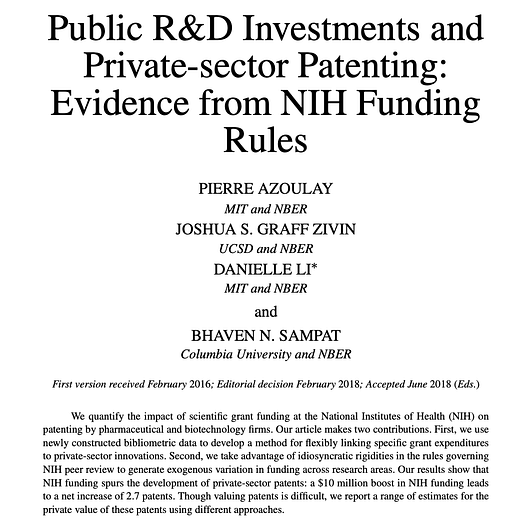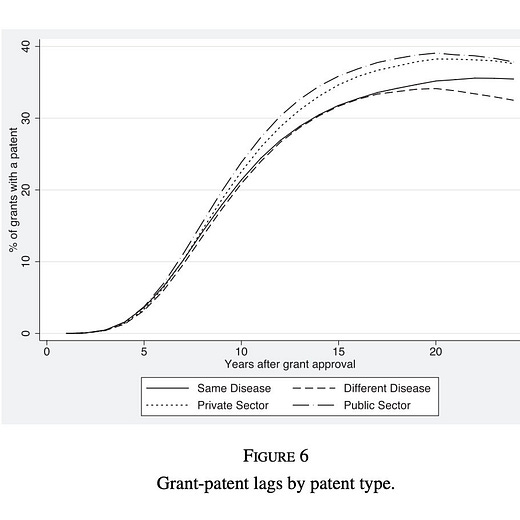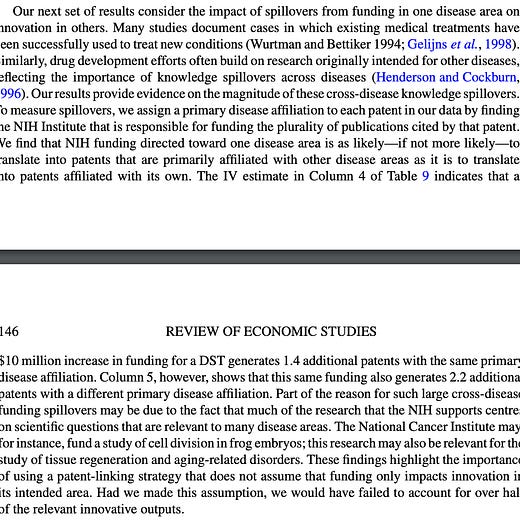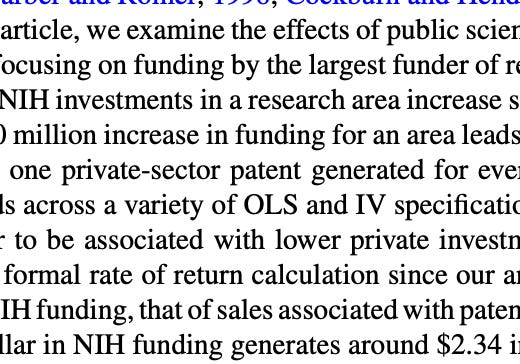Best of #econtwitter - Week of June 19, 2022 [3/3]
Jun 20, 2022
Welcome readers old and new to this week’s edition of Best of Econtwitter. Thanks to those sharing suggestions, over email or on Twitter @just_economics.
This is part three of three.
Paper summaries

Supreet Kaur@supKaur
Poorer children show cognitive fatigue faster than richer ones, and attend schools that give fewer chances to build attentional capacity. But this can be improved with simple changes at school--as we show in our Cognitive Endurance paper. Summary below! @christinalbrown @h_schof

Christina Brown @christinalbrown
New NBER working paper with @supKaur @h_schof @GeetaKingdon showing:
- how formal schooling contributes to the development of fundamental cognitive skills, like attention
- attention appears to be highly malleable, at least in childhood
https://t.co/cLHihRUQyt
🧵 (1/x)
2:39 AM · Jun 17, 2022
208 Reposts · 974 Likes

Christina Brown@christinalbrown
BUT how much cognitive decline people suffer varies enormously and, across the variety of settings we look at (work, voting, school), low SES individuals exhibit much larger declines. 3/

3:33 PM · Jun 13, 2022
3 Reposts · 24 Likes

Stefano DellaVigna@sdellavi
New NBER wp: Many diff-in-diff papers use state level laws, but what do we know about those? Two key facts. From 1950s to 90s, best predictor of law adoption is adoption by geographic neighbors. Last 20 yrs, best predictor is adoption by politically aligned states #polarization

NBER @nberpubs
Analysis of the diffusion of state-level policies in the US and how it relates to different models of policy diffusion, from @sdellavi and Woojin Kim https://t.co/7AHek96YcN https://t.co/NWodoTf1l3
3:28 PM · Jun 18, 2022
48 Reposts · 251 Likes

Fabio Ghironi@FabioGhironi
Friends and students occasionally ask me about the genesis of my 2005 QJE paper with Marc Melitz on “International Trade and Macroeconomic Dynamics with Heterogeneous Firms.” Here is the story, for anyone who may be interested. 1/n

5:20 PM · Jun 19, 2022
64 Reposts · 387 Likes

Pamela Medina Quispe@pame_medinaq
Happy Friday, #Econtwitter! My paper with @drewkoke and @jj_eugene_tan is forthcoming at AEJ: Macro! 🎉
We study the short-term effects of an import-competition shock on capital reallocation and aggregate productivity in the domestic economy.
What do we find? A 🧵...

AEA Journals @AEAjournals
Forthcoming in AEJ: Macroeconomics: "Capital-Reallocation Frictions and Trade Shocks" by Andrea Lanteri, Pamela Medina, and Eugene Tan. https://t.co/ni940Dw74d
7:47 PM · Jun 17, 2022
28 Reposts · 103 Likes

Shosh Vasserman@shoshievass
@RevEconStudies @SNageebAli @PennStateEcon @econ_greg @MSFTResearch @StanfordGSB @nberpubs A few years ago, I wrote a thread introducing a paper on "Voluntary Disclosure & Personalized Pricing" with @SNageebAli and @econ_greg (threadreaderapp.com/thread/1186778…).
Now that the paper has been accepted for publication, an update on what the paper is about 👇 1/n
threadreaderapp.com
Thread by @shoshievass on Thread Reader App

3:32 PM · Jun 13, 2022
5 Reposts · 19 Likes

Alexander Berger@albrgr
I hadn't re-read this paper in a while, it's an absolute banger: joshgraffzivin.com/s/NIH-Patents_…
NIH grants lead to ~just as many patents on diseases that aren't what they were focused on as what they were.




10:32 PM · Jun 15, 2022
15 Reposts · 129 Likes

Ethan Mollick@emollick
This is a very grim presentation on the status of biomedical research in America by one of the world experts on how science gets done. Institutional decay among our health agencies (visible during COVID) is slowing progress, philanthropy is helping, but more needs to be done.


Pierre Azoulay @pierre_azoulay
@klakhani @albrgr Gave a talk at Northwestern outlining my thoughts on the topic. Trigger warning: it's pretty grim. https://t.co/F1w4F1SL17
9:09 PM · Jun 16, 2022
11 Reposts · 44 Likes
Interesting discussions

Justin Fox@foxjust
The number of Americans with disabilities is up by about 2 million since before the pandemic. Wonder why that is? bloomberg.com/opinion/articl…

3:14 PM · Jun 15, 2022
1.09K Reposts · 3.23K Likes

Justin Fox@foxjust
The disability increase has been driven mostly by people saying they're having "serious difficulty concentrating, remembering, or making decisions." And, yeah, it's tough to concentrate these days. But that also sounds like it could be Long Covid bloomberg.com/opinion/articl…

3:21 PM · Jun 15, 2022
104 Reposts · 388 Likes

Beatrice Cherrier@Undercoverhist
JoE story is even more interesting. 1971 AEA resolution that established CSWEP had provisions for the creation of "open listing of all employment opportunities” Galbraith contemplated setting up a joint CSWEP/hiring practices committee, but latter was chaired by Ray Marshall...

Stephan Lefebvre @LefebvreEcon
Are younger economists today aware that JOE (Job Openings for Economists) was formed in 1974 in response to women demanding equal employment opportunities in the discipline? This happened shortly after CSWEP was formed (1972).
JOE - brought to you by feminism
1:42 PM · Jun 16, 2022
5 Reposts · 19 Likes

Jessie Handbury@jessiehandbury
Great question. I have found a few types of mentorship useful.
A lot is similar to what a grad advisor does, but just because we got a PhD doesn’t mean we’re fully-baked!
It may sound like a lot but not all of these “services” have to be by the same person…1/N

Gordon Hanson @gordon_h_hanson
Lot's of senior faculty now talk the talk of mentoring junior scholars. Whether we walk the walk is another question. To younger faculty, what works for you and what doesn't when it comes to mentoring?
10:57 AM · Jun 18, 2022
11 Reposts · 63 Likes

John Horton 🇺🇦@johnjhorton
Billion (trillion?) dollar use case for DALL-E: creating non-infringing artwork for your academic papers

11:38 AM · Jun 13, 2022
3 Reposts · 40 Likes

